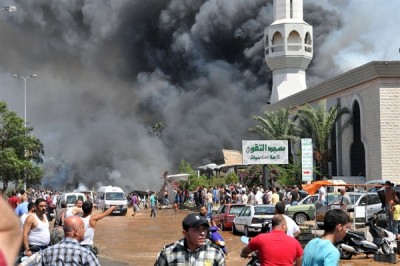
*By: Domhnal O’Sullivan
Speaking in late August in the wake of a deadly bomb attack in southern Beirut, veteran Lebanese politician Nabih Berri warned that the ‘Iraqization’ of Lebanon would be a disastrous eventuality for the increasingly fractured nation. The gravity and prescience of his comments were confirmed just two days later, when twin car bombs in the northern city of Tripoli killed 42 people outside a Sunni mosque. Although attacks on such a scale have not been repeated since, tensions have remained high.
From Baghdad to Beirut
Comparisons with Iraq can be drawn from several worrying trends. Firstly, the overtly sectarian nature of much of the violence in Lebanon, which mirrors a growing Sunni-Shia rift spreading throughout much of the Middle East, also reflects the violence which has plagued Iraq since the 2003 US invasion. Two separate car-bombings in Beirut in August specifically targeted Shia Hezbollah, while the subsequent attack in Tripoli – itself a constant flashpoint of sectarian strife – took place outside a Sunni mosque. Fuelling and fuelled by the tension, disparate sectarian groups – including Al-Qaeda offshoot Jabhat al-Nusra – have proliferated.
Secondly, the scale and nature of the attacks has raised concern. The recent incidents – the most bloody since Lebanon’s civil war – have provoked fears that the previous uneasy stability has definitively evaporated. Especially worrying is the modus operandi of car-bombings. This draws comparisons once again with the situation in Iraq, where such methods are a recurring feature of the almost daily attacks. Materially difficult to police and prevent, this raises the spectre of dangerous terrorism and has instilled fear amongst certain sections of the Lebanese population.
The third trend provoking comparison and consternation is the level of outside interference. The country has always been a pawn on the Levantine chessboard, moved around by the strategic whims of its more powerful neighbours. Since the Syrian conflict, however, rival powers from the Gulf and Iran have stepped up the proxy war in a bid to safeguard regional interests. Backing from Saudi Arabia is said to be funding not only parts of the Syrian opposition but also Sunni groups in Lebanon, while Iran continues to play the card of its proxy in Beirut, Hezbollah. This echoes the Iraqi scenario, where hidden hands instrumentalise local groups on another substitute battleground for regional hegemony.
The Lebanese exceptionality
But Lebanon is not Iraq. Internal political and security dynamics are vastly different. Iraq has emerged from the devastation of the past decade unable to provide for its own security and harbouring sizeable minority groups which are embittered and radical. It often appears at the business end of indexes of failed states. Lebanon, despite the destruction of its civil war and the 2006 conflict with Israel, has persistently managed to recover and has maintained the shell of a functioning state. Although weak and liable to interference, the Lebanese security forces continue to enforce day-to-day order. Politicians in Beirut, despite current dithering, have avoided alienating any significant portion of the diverse population.
The pervading presence of Hezbollah also differentiates the Lebanese case. Operating what essentially amounts to a state within a state, such is the military clout of the Shia group that it is difficult to see how the security situation could develop in either direction without its tacit consent. At this point in time, embroiled in what it may view as an existential battle in Syria, it is not in Hezbollah’s interests to see any significant breakdown of security in Lebanon.
Ultimately, ‘Iraqization’ fears are a perhaps exaggerated response to the current ‘Syrianization’ of Lebanon. Although it has deep-rooted institutional issues that must be addressed in order to strengthen the state and definitively avoid any descent into Iraqi-style chaos, current problems are a direct consequence of the violence next door. The major political cleavage in Lebanon still revolves around pro- and anti-Assad affections, while the refugee situation is increasingly untenable; numbers are set to hit the million mark by the end of this year.
Keep the aid flowing
In the short-term, efforts to help Lebanon cope with the consequences of the Syrian crisis should thus continue to be prioritized. More funding from the international community to help with the staggering refugee situation – which itself presents a profound social and security threat – is necessary. The inaugural meeting of the International Support Group for Lebanon, which convened in the margins of the recent UN General Assembly, may galvanise more support in this respect.
Political pressure for solidarity and cooperation in the face of security threats is equally important. This is notably the case as regards Hezbollah, without whose cooperation national stability is almost impossible. Repeated international statements urging all groups to respect the Baabda declaration – which outlines the official policy of Lebanese disassociation from the Syrian conflict – have fallen on deaf ears. But the recent cooperation between the Shia group and the Lebanese security forces in policing the southern suburbs of Beirut (previously controlled almost exclusively by Hezbollah) is a tentative signal that it could be somewhat committed to tackling internal issues in a less unilateral manner.
Longer-term, such cooperation in tackling Syrian spillover could be subsequently used as a springboard for efforts to reform the political and security apparatus in Lebanon. The National Dialogue initiative, which sits all political groups around the table, is a useful forum for starters. President Michel Sleiman’s National Defence Strategy, which maps out a way to simultaneously strengthen the Lebanese Armed Forces while working towards the disarmament of Hezbollah, could also be prioritized as a win-win situation in tackling Lebanon’s security and defence issues.
Open Democracy
* An international security analyst, holding an MA in International Relations from the College of Europe, Bruges. He has conducted extensive research into Lebanon and the Levant.

Leave a Reply
You must be logged in to post a comment.